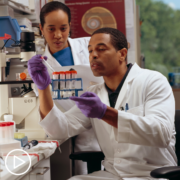What Are the Benefits of Myeloma Consults and Second Opinions?
What Are the Benefits of Myeloma Consults and Second Opinions? from Patient Empowerment Network on Vimeo.
What can myeloma consults and second opinions bring to patients? Expert Dr. Ola Landgren from University of Miami Sylvester Comprehensive Cancer Center discusses the benefits of consults, second opinions, and myeloma specialist centers.
Download Guide | Descargar Guía
See More from START HERE Myeloma
Related Programs:

|

|

|
Transcript:
Lisa Hatfield:
I’m going to segue into a comment that I always make to myeloma patients. As Dr. Landgren was explaining all of these treatment options, he is on top of all the latest and greatest news and therapies. I always recommend to myeloma patients newly diagnosed or otherwise to seek out at least one consult from a specialist. If you have difficulty accessing care, then a lot of places can do video conferencing, but even that one consult to see a myeloma specialist is so important in your care and treatment options. So I’ll just throw that out there, Dr. Landgren, as a myeloma specialist that you are, we appreciate your expertise in explaining that so well.
Dr. Ola Landgren:
I agree 100 percent with what you said, and I would like to add to that and say, going to a specialist center and it doesn’t have to be here, can really really help. It can be a lot of small things. There is data indicating that survival is longer for patients who have access to specialists. That has been published in the Journal of Clinical Oncology. The Mayo Clinic has published that, I think it was more than one year longer survival.
That by itself is, of course, very strong, but I also think that there are a lot of the small things like the different types of pre-medications, the drugs that are given around myeloma drugs. Could you decrease the dose of some of these drugs like the dexamethasone (Decadron)? Could you get rid of Benadryl if you give the antibodies? These may look as small things, but they can make a huge difference for quality of life.
We have a lot of people coming for second opinions, and we always say if you live closer to someone that you trust, you should go back and be treated there. You can always reach out to us. We are happy to be involved. You have us as a backup. We can be your quarterback if you ever need us. I think that is absolutely the best advice for every patient. Go and get feedback and if you’re not sure about the feedback you get, you could always have two different quarterbacks and you could ask them. I don’t think having 10 or 20 is going to help, but having one or two second opinions, I think is a good decision.
Share Your Feedback:
Create your own user feedback survey






